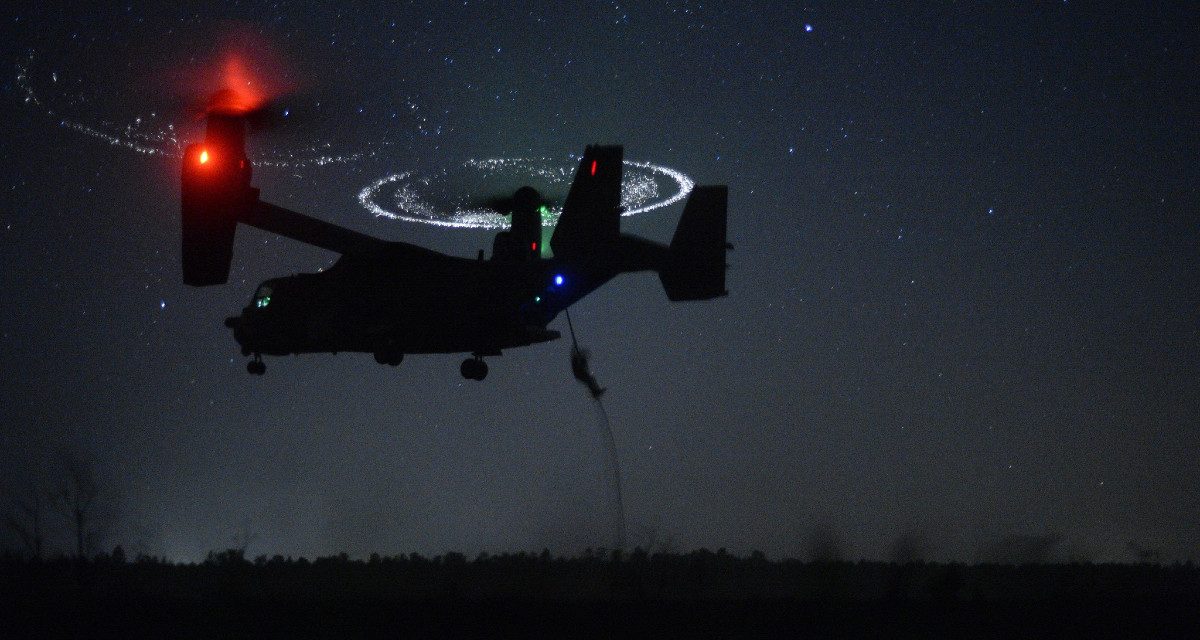Irregular warfare is executed across all domains and when operations require air support, Air Force Special Operations Command (AFSOC) stands ready to provide specialized skill sets to IW practitioners. As irregular warfare faces an uncertain future, so does AFSOC and its air commandos. The command stands at an inflection point in which it must prepare to compete against great powers while continuing the fight against violent extremist organizations. How must AFSOC change in order to meet divergent demands for specialized airpower?
Episode 44 explores AFSOC’s current efforts to build the organization that will be needed to meet future threats. Our guests begin by explaining AFSOC’s role within the irregular warfare space. They continue by discussing how AFSOC can manage to adapt to new adversaries and threats in a flat resourcing environment. They then discuss how AFSOC can leverage its human talent to incorporate new technologies and find innovative solutions to future problems. They conclude by examining the possibilities of different metrics of success within IW and how great power challenges may need to define success along multiple time horizons.
Lt. Gen. James C. “Jim” Slife is the commander of Air Force Special Operations Command, the Air Force component of US Special Operations Command. AFSOC provides Air Force special operations forces for worldwide deployment and assignment to unified combatant commanders. The command has approximately 20,800 active duty, reserve, Air National Guard, and civilian professionals.
Lt. Gen. Slife was born outside of Detroit and grew up in Hot Springs, Arkansas. He was commissioned through the ROTC program at Auburn University and has spent the majority of his career in special operations aviation assignments, deploying extensively.
Dr. Richard Newton is an adjunct professor at the Joint Special Operations University. His areas of expertise include irregular warfare, airpower, and the integration of special operations and conventional forces at the theater level. He has developed and delivered special operations–focused curriculum for the US Army Command & Staff College, US Naval War College, US Army School of Advanced Military Studies, Joint Forces Staff College, Joint Advanced Warfighting School, and NATO Special Operations School.
Dr. Newton graduated from the US Air Force Academy in 1977 with a BS in military history. After graduation he earned his pilot wings and went on to serve twenty-two years as a combat rescue and special operations helicopter pilot, combat aviation advisor, strategic planner, and educator.
The hosts for this episode are Laura Jones and Shawna Sinnott. Please contact them with any questions about this episode or the Irregular Warfare Podcast.
The Irregular Warfare Podcast is a product of the Irregular Warfare Initiative, a collaboration between the Modern War Institute at West Point and Princeton University’s Empirical Studies of Conflict Project—dedicated to bridging the gap between scholars and practitioners to support the community of irregular warfare professionals. IWI generates written and audio content, coordinates events for the IW community, and hosts critical thinkers in the field of irregular warfare as fellows. Make sure to follow IWI and subscribe to the IWI newsletter so you don’t miss any content!
Image credit: Staff Sgt. Jonathan Snyder, US Air Force


Great podcast and topic. Really appreciate General Slife taking the time to share his thoughts about current and future operations in AFSOC. I hope these discussions about Great Power Competition involvement in destabilized countries and strategic advantage continue. I know that a lot of us in AFSOC are struggling to find purpose right now especially after the abrupt end to a decade long war. I understand not wanting to jump into other countries without defined goals, but as we continue to waiver on what we ought to do and ought not to do it seems like Russia, China, and Iran are gaining influence, building partners, and maneuvering forces for strategic impact and gain. The National Security Strategy draws emphasis on building partnership capacity and Japan is a case study of success on how we can do this right. I hope for our sake and our allies we define what success is in IW.
USAFSOC will definitely need an "Armed Overwatch" light attack plane (LAP) and it is surprisingly frustrating that it is taking so long to field one. The propeller LAPs seem suitable for their long loiter time, easy to conceal and pass as local aircraft, and slow speeds, but now that some may have been captured in Afghanistan, I do wonder if USAFSOC will bother now that most of the technology may have fallen into peer nations' hands for reverse-engineering, hacking, and deciphering. Obviously, training, weapons, and sensors will differentiate the AFSOC one from the former Afghan National Air Force ones.
Fielding the "Mojave" drone might be another form of AFSOC CAS, but personally, I think that a manned LAP would be needed.
The lack of an "Armed Overwatch" LAP is the main weakness of US SOFs and through "Red Tape" or political hurdles, USSOCOM should field at least tilt-rotor drones to provide SOFs CAS and air cover. There is no shortage of viable options for SOF CAS and the feet-dragging means that SOFs have to depend on their small arms or (massive and expensive) AC-130s, MQ-9 "Reaper" drones, and CV-22s for direct-action AFSOC air firepower in which the CV-22 lacks adequate armament for CAS. Many true non-fiction books were written where SOFs under fire had to wait for a long time for CAS to arrive to shift the odds when US SOFs were pinned down by enemy fire. A solution to this CAS problem exists, but again, either through monkey wrenches or political muck, nothing has materialized when it should.